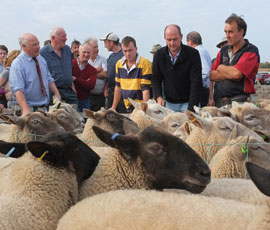Be on guard for scab at summer sheep sales

As the first of the season’s major sheep breeding sales get under way this week, sheep producers are being urged by vets to be “scab savvy” and quarantine and treat all newly purchased stock – irrespective of any pre-sale anti-scab treatments that may have been applied.
Vets say many farmers have the dramatic images in their minds of sheep badly infected with scab but must realise that scab infection can be more insidious and a sheep can look healthy and still be carrying scab mites.
Sheep showing no outward signs of itching or wool loss can still harbour a dormant mite population that will erupt at the onset of cooler, damp conditions in the autumn.
The persistent wet summer weather and lower seasonal temperatures may also have triggered an earlier period of activity of scab mites – a situation exacerbated by the long delay in getting flocks clipped this summer as fleeces have remained sodden.
Edinburgh vet Kath Dun, secretary of the Sheep Veterinary Society, said all sheep producers trading in stock must assume any sheep arriving on the farm are infected with scab and treat them accordingly.
“Any sheep brought on to the farm are a potential source of infection and it’s in the interests of every flock owner – as well as for the wider control of the spread of scab – to administer an anti-scab treatment, even though they may have assurances from the vendor that this has been undertaken,” said Mrs Dun.
She advises buyers to ask when sheep were treated, with what product and what other sheep stock they have come in contact with since the treatment.
Vets say all sheep brought on to the farm must be quarantined and the isolation area must be totally free of contact from other sheep.
“These are measures that don’t involve a great deal of organising and yet they can mean the difference between leaving the door wide open for scab to get a hold in your flock or making sure you have blocked any risk from day one.”
And it’s critical to isolate all newly purchased sheep – even when they are given an anti-scab treatment on arrival, said Mrs Dun.
“Although plunge dipping in an appropriate dip product will provide an immediate treatment and kill mites, farmers using other treatments are still at risk of importing infection if they fail to isolate for the period required for the treatment to become effective.”
“Any sheep brought on to the farm are a potential source of infection and it’s in the interests of every flock owner – as well as for the wider control of the spread of scab – to administer an anti-scab treatment, even though they may have assurances from the vendor that this has been undertaken.”
Kath Dun
Mrs Dun said it’s important for farmers to check precisely how long it takes for the anti-scab treatment they use to actually kill the mites.
“Newly bought sheep given an anti-scab treatment aren’t safe to turn out with the home flock immediately. They are still capable of passing mites on to other sheep until the treatment has been given the prescribed time to work.”
Clothing worn at sheep sales when sheep are being examined prior to purchase can also increase the risk of scab mite spread, according to Cumbria vet Matt Colston.
“Ideally anyone sorting through sheep they may intend to buy – or dealing with sheep in any way at a sale – should wear waterproof clothing that can be washed down. Scab mites will readily move on to fleeces and other clothing if they get the chance. Wearing waterproofs provides another barrier to spreading infection,” said Mr Colston of Frame, Swift and Partners, Penrith.
Find out more about sheep scab and how to control it with our online academy
